- Home
- Courtney Milan
The Turner Series Page 50
The Turner Series Read online
Page 50
But Mark knew what a good sheepdog meant to these men. Not just income, but companionship, friendship, the difference between a hardscrabble life and comfort. It was as if the man had offered him his firstborn child.
“Mr. Taunton, I came to Shepton Mallet to think…to think on an opportunity that presented itself to me. You see, I’ve been asked to join the Commission on the Poor Laws.”
Taunton, for all the dirt he carried, nodded sagely. “That’s…an honor,” he said, his mouth twitching.
Mark rubbed his forehead. “You mean it’s a nuisance. I’m not a proponent of the Poor Laws, and the Commission has bungled the administration worse than Parliament. I’ve no wish to spend my time attending to details like the allotment of gruel at workhouses around the country.”
Taunton drummed his fingers against his knee. “If it’s a mess, mayhap you could clean it up. Happen they could use a good man.”
“I know. It’s the only reason I haven’t turned the offer down flat.”
And people—important people—would listen to him if he said the system was falling to pieces. He could make a difference. He’d been granted a measure of popularity by fate; he had an obligation to use it to do good. He just wished it didn’t sound like such an ever-loving chore.
“But, you see, if I accept the position, I’ll be traveling constantly. I’d have nowhere to keep a dog. Surely, Daisy’s pup deserves better.”
Mark looked across into a face that was slowly shuttering.
“Of course,” Taunton muttered. “You’ll be going into the finest drawing rooms. No room there for a filthy mutt.” His shoulders squared. “Well, perhaps I might be of service some other way.” He looked around the room.
Maybe Mark didn’t think of his mother’s actions as pure charity. But this man—this proud man—undoubtedly did. Mark could as soon have cut the man’s hand off as refuse the offer.
“But my brother,” he heard himself saying. “My elder brother—he’d not lock the animal up in a tiny London parlor. And I know he’d enjoy having an animal around. I was thinking just the other day that I ought to get him one.”
The man looked up, the light returning to his eyes.
“In fact,” Mark promised, “I’m sure he’d want it. And the dog would be happier with him.”
Taunton broke into a broad grin. “It needs a few days yet with its dam. But you’re right. I suppose there’d be more room to romp at Parford Manor.”
“Actually,” Mark started to say, and then realized that he didn’t need to clarify which brother he’d intended the gift for. “Actually, I won’t be visiting him immediately in any event, so a delay is just as well. Thank you. You’ve no idea what this will mean to my brother.”
Taunton gave him a jerk of a nod. “Truthfully, Sir Mark—this scarcely means anything. All these years, I’ve carried the shame of knowing I should have done more. About…about your sister. And you and your brothers. I saw what was happening, when I first came back, but didn’t dare to speak up.”
Mark sat still, not wanting to move. Not wanting to acknowledge by so much as a breath that those words reached any part of him.
Taunton continued, “Only one person in all of Shepton Mallet would have stopped that kind of wrong when it happened. And she was Elizabeth Turner.”
One nod, that was all Mark could manage.
“I always thought that what happened to you and your brothers after she passed on—that was her way of looking out for you, once she found her way round to herself again.”
“Yes.” Mark felt as if he were standing at a great distance from the conversation. “Yes. I suppose it was.” The silence grew after that, and the man took his leave.
After he’d gone, Mark wrapped his arms around himself. Sometimes he thought he was the only one of his mother’s sons who could see her clearly. She’d always been stern and earnest; devout, too. Even before she went mad, she’d had no balance, too much excess. She’d afflicted all her children with Bible verses for names, after all.
She’d seen a great deal of suffering and had thought it her duty to alleviate it. She’d also seen a great deal of sin and had railed against that, too. Mark didn’t remember his father at all, but he remembered his mother. All too well.
She’d let Hope, his elder sister, perish by neglect. She’d beaten Ash. She’d locked Smite in the cellar for…for longer than Mark could truly remember.
But Mark… Mark she’d spared. She’d not felt it necessary to cleanse the devil from his soul. She’d told him once she didn’t need to, because he alone was her son, not his father’s. That she’d seen herself in Mark, that she’d identified in him the same unwieldy imbalance that had torn her to pieces, he kept first and foremost in his mind. Perhaps that was why he’d become who he was. He’d had to prove to himself that his mother’s finest qualities—her compassion, her charity, her goodness—could be married to peace and tranquility. He wanted to prove that he could be good without going mad.
The thought of dedicating his life to the Poor Laws made him feel frenetic and unbalanced. It would be good. It would be righteous. But he didn’t want to do it.
He’d come to Shepton Mallet to find himself. Instead, he’d met Mrs. Farleigh. Mark smiled faintly and thought of her fingers, warm and curling about his. The soft pressure of her lips—he’d have wondered what he’d been thinking when he kissed her, except it was perfectly clear he’d not thought at all.
And now, he didn’t want to do good. He wanted to do it again.
London, the Commission and every gossip rag in the country could wait another week.
LONDON, IT TURNED OUT, had other thoughts.
Three days later, Mark ventured into town. He was on his way to the square to deliver another handful of letters when a familiar voice stopped him.
“Sir Mark!”
Parret was the last man Mark wanted to see at the moment. Still, the tiny man hurried over, his boots clattering over cobblestones. He held his hat to his head with one hand as he ran, lending an odd, undulating appearance to his stride. “Sir Mark. I was hoping—it’s just you and me, out here in the country.” Parret stopped a few feet before him next to the gray stone of the Market Cross, doubling over. His words spilled out between gasps of air.
“Indeed,” Mark said ironically, indicating the people around them.
But Parret appeared gratified. He removed his top hat, revealing a pate covered by a few sparse, carefully combed strings of hair, and wiped beads of sweat off with a yellowing handkerchief of doubtful cleanliness. “Perhaps you might consider an exclusive interview?”
Nigel Parret was nothing if not persistent. Mark would have admired him—or, at a minimum, felt sorry for him—except that the man published the most intrusive articles. On one particular occasion, he’d actually picked through Mark’s household trash and had published a piece in which he had explained, on rather dubious grounds, that Sir Mark preferred leg of lamb to beef.
It happened to have been true…at least, it had been true until Mark was served lamb at every dinner he’d gone to for a fortnight.
And that hadn’t been the worst of Parret’s sins. Three months ago, Mark had danced one dance with Lady Eugenia Fitzhaven. She had seemed a sweet girl—emphasis on girl—and he was friends with her father. It had also happened to be the supper dance, and so he’d taken her in to the meal. A hundred men in London had done the same for a hundred ladies throughout town that evening, and nobody had spoken of those conversations again. But Mark was not a hundred men. He was Sir Mark.
Of course, he’d observed the brightness of her eyes, the color of her cheeks. He couldn’t help but notice that she was utterly tongue-tied in his presence. He couldn’t prevent impressionable young girls from imagining themselves in love with him. All he could do was recognize when the infatuation started and do his best not to offer them encouragement. Girlish appreciation had a way of working itself to nothing if he offered a polite distance. It didn’t take long for most ladies to shift their attentions to
a source who would appreciate it.
But Nigel Parret had found Lady Eugenia before her affections had a chance to alter. He’d spoken to her, and she had told him every detail of her unrequited fancies. She’d outlined her childish plan to win Mark’s affections—mainly this had involved looking radiant in his presence. She’d enumerated the children she planned to have with him once they were married. Mark still winced, thinking of it.
Parret had published her juvenile dreams on the front page of his paper. Mark’s reputation hadn’t suffered—the article had made it painfully clear that Mark had done nothing whatsoever to encourage the girl—but children of that age hardly needed encouragement to dream. There was no way to stop them from wishing for the impossible.
No way, that was, except to expose their aspiration to the ridicule of all London society.
Lady Eugenia had become a laughingstock; Nigel Parret had collected a small fortune selling papers. And Mark had stopped talking to young, impressionable ladies.
Parret stared up at Mark now with a certain speculative hunger. Mark could almost see the next article brewing in those calculating depths. Maybe, this time, he’d analyze Mark’s woodpile. What his column would make of Mrs. Farleigh, Mark didn’t want to know.
“One little interview,” Parret said, in what Mark supposed was intended to be a cajoling tone. “Just a few questions.”
“Not a chance. You are the last person on earth to whom I would grant an exclusive interview.”
Parret nodded as if Mark had not just insulted him, pulled out his notebook and started scribbling.
Mark glanced down uneasily. Parret wrote in a large, round hand—visible even upside down at two paces.
Your correspondent met with Sir Mark in his birthplace of Shepton Mallet. The man wrote with astonishing speed. Upon seeing his dear friend—for so, my readers, I dare to believe Sir Mark thinks of me—Sir Mark greeted me with effusive superlatives.
“I did not!”
“Last person on earth,” Mr. Parret contradicted aloud. “Very superlative indeed.”
He continued writing. He displays his usual good humor and humble nature, disclaiming the compliments I bestowed upon him.
Enough of that game. Anything Mark said would be twisted to feed Parret’s rapacity for gossip. Mark folded his arms and tried to figure out some way to ask Parret to take himself to the devil—in a way that couldn’t be twisted about. Parret looked up at him, his head tilted, as if waiting for Mark’s next comment.
Mark pressed his lips together and tapped his fingers against his elbow.
My kindness in visiting him, however, mostly shocked him speechless. Still he agreed to conduct an exclusive interview with me—one which I now convey to you.
“I agreed to no such thing,” Mark said through gritted teeth.
Parret’s head bobbed as he wrote. “Here I am, speaking with you, no other reporters present. This implies a certain degree of exclusivity.”
Mark shook his head, turned and walked away. Naturally, Parret followed. “Communication,” he said, “is an amazing thing. I can read responses in the turn of your head. The set of your chin. So long as I don’t put quotation marks about your words, and I speak no ill of you, you can’t possibly stop me.”
Mark didn’t respond and lengthened his stride.
Parret trotted beside him, his breathing labored. “I am the only reporter here,” he continued. “No matter what any other enterprising souls may say. And you know, it is I who have investigated some of the cruder reports about you and discredited them as jealous whispers. If it were not for my tireless reporting, that incident last year with Lady Grantham might have taken hold.”
“There was no incident with Lady Grantham,” Mark said. “Everybody knows that. Nobody believes the lies that some people try to spread about me.”
“True,” Parret said. “But, I flatter myself, I have done quite a bit on that count myself. If you knew the number of stories I had heard about you, the number of allegations made without support.” He shook his head. “And that little bit of wordplay I heard the other day…that was not an allegation made without support, was it?”
Mark stopped dead and turned to Parret. “Are you trying to blackmail me into giving in to your demands?”
“No, no!” He paused and rubbed his mustache. “Well, only if it would serve.”
Mark rolled his eyes. “You may put quotation marks about this, if you choose, and place it in your paper—I would rather sell my soul to the devil than have you make another shilling off my reputation.”
“The devil can have your soul. I just wish to maximize my income.”
Mark turned away once more, walking as swiftly as he dared. He could see the churchyard now, and a knot of townspeople collected in front. Maybe if he waved them over, he could…
He could what?
Have them toss Parret out on his ear? Lock him up on trumped-up charges? Either option seemed a fine idea. Almost as good as getting his hands on the man, lifting him bodily by the collar…
Mark shook his head to clear it of the violence of those thoughts. He wasn’t about to lose his temper, his balance. Not to a little puddle of ethics like this man.
“And if you won’t speak to me,” Parret said, “someone else will. I’d love to write about the woman you spoke with—Mrs. Farleigh, was it? It could be like Lady Eugenia all over again.”
A swell of ugly emotion bore down on Mark. It slammed across him, knocking him practically breathless. He felt like a chip of wood, riding raging floodwaters. And before he could think better of it, he turned, abruptly, and tripped Nigel Parret. As the tiny man went sprawling, Mark grabbed his arm and wrenched it around. His other hand twisted in the collar of the man’s greatcoat. He picked the man up bodily.
“Sir Mark!” Parret squeaked, his feet kicking out in midair.
Mark had a mental image of himself slamming the man repeatedly against the stone wall of the tavern. The thought was almost too satisfying— Parret’s nose bleeding, his hands scraped.
Mark took two steps toward the nearest house.
Stop. Stop.
But he didn’t want to. He fumbled for calm. It felt like floundering. His knuckles scraped against the greasy fabric of the man’s collar.
Mark turned to the side and lifted the man skyward. Parret gave a little shriek, one that was all too pleasing to some corner of Mark’s vengeful soul. His feet kicked out. And then Mark let go.
The resulting splash sent a shower of droplets into the air, misting Mark’s face.
In the murky water of the horse trough, Parret sputtered and wiped his face. A horse, tied to a ring nearby, let out a great sighing bluster, as if to say, Oh, please. Not in my water.
“You’re wrong,” Mark said. “I can stop you.”
But there was no sense of righteous victory in these words. Instead, he felt a sick, hollow regret. He’d lost his temper. Again.
That vision—of his slamming Parret’s limp body against the stone wall of the public house—lingered still, an uninvited, unsavory guest. Mark could almost feel the reverberations in his arms, as if the ghost of his awful want had taken up residence.
Parret stared up at him, speechless for once.
It wasn’t the first time Mark had crossed the line between that red, hazy want and violence. It wasn’t the first time he’d regretted it, either.
Mark sighed and shook his head. “Understand, Parret. You are not going to have an exclusive interview with me. Not in reality, nor will you print one in the public imaginings you call articles.”
“But—”
“No.”
“But—”
“Certainly not.” Mark set his hands on his hips.
“But—”
“And not that.”
“Sir Mark,” Parret pleaded. “I have a daughter. I—I have cultivated your reputation, as carefully as any steward. Have I ever printed anything maligning you? I’ve made my reputation—my career—on telling the truth
about you. Should we not work together on this?”
The crowd of women was beginning to drift from the churchyard. No doubt they were intent on finding out why Sir Mark had just dumped a man in the horse trough.
“I know what it is,” Parret said, a sudden note of jealousy infecting his voice. “You have had a better offer from someone else, no matter what…what I said. That other reporter has offered you a cut. What was it? Ten percent? Fifteen percent?” He dropped his voice. “I can better it. I will. I promise.”
“I’m not interested in your promises.” Mark could not make himself focus on any of the people who were coming this way. None of them, that was, except one. Jessica. Mrs. Farleigh was there. She was not a calming influence; she never had been. But his attention focused on her.
“You think you’re more powerful than me,” Parret spat. “That your run of popularity is your own doing. I made you, Sir Mark. I could break you, if I chose. You owe me your success.”
Mark shook his head and turned away. “I don’t owe you a thing,” he said. “And I’m only going to warn you once. Get out of here. Leave town.”
Parret scrambled out of the slick trough, doing his best to invest the clumsy exit with a sullen dignity. “Someday,” he said formally, “you will regret this.”
“Interview me in London,” Mark said with a wave of his hand, “and I’ll tell you precisely how much I regret it.”
JESSICA HAD WANTED to see Sir Mark again, but not now. Not like this. Not with the letter from her solicitor folded in her skirt pocket, with its precise measurement of her freedom—or lack thereof.
Over the past few weeks in this small town, she’d found some sense of peace. She had begun to reclaim herself. But the first paper from her solicitor laid out her debts—too many—and her assets—too few. Rent on a flat in London, the amounts she’d spent here… In three weeks’ time, when the quarterly bills came due, she’d find herself at the end of her savings.
The other paper, enclosed by her solicitor, had come from Weston.
Sir Mark’s decision is expected in the next few weeks, the man had written. Seduction is of no use to me if it comes too late. Finish it now.

 Her Every Wish
Her Every Wish Midnight Scandals
Midnight Scandals After the Wedding
After the Wedding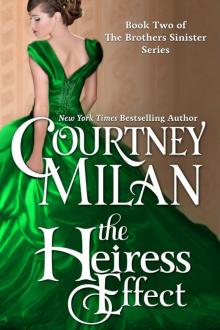 The Heiress Effect
The Heiress Effect Unraveled
Unraveled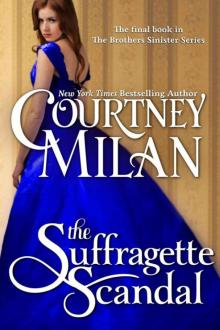 The Suffragette Scandal
The Suffragette Scandal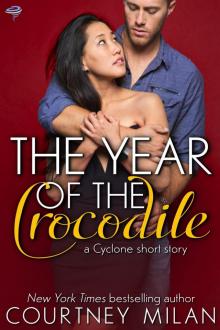 The Year of the Crocodile
The Year of the Crocodile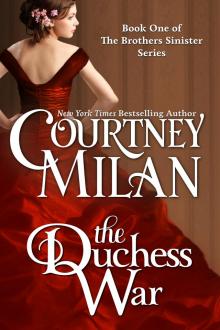 The Duchess War
The Duchess War What Happened at Midnight
What Happened at Midnight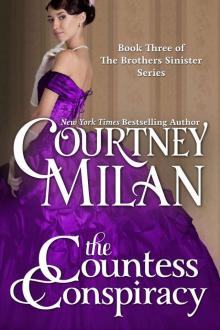 The Countess Conspiracy
The Countess Conspiracy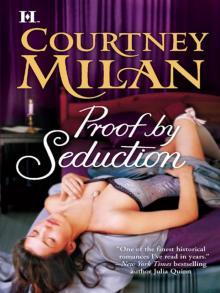 Proof by Seduction
Proof by Seduction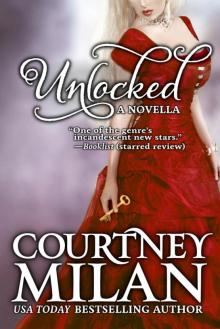 Unlocked
Unlocked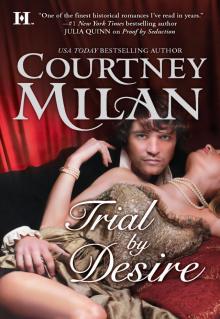 Trial by Desire
Trial by Desire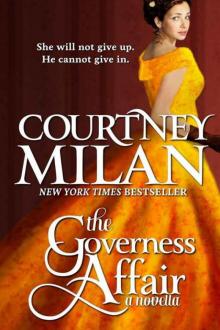 The Governess Affair
The Governess Affair Unveiled
Unveiled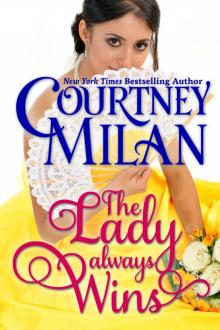 The Lady Always Wins
The Lady Always Wins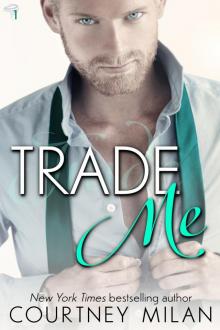 Trade Me
Trade Me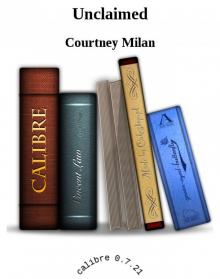 Unclaimed
Unclaimed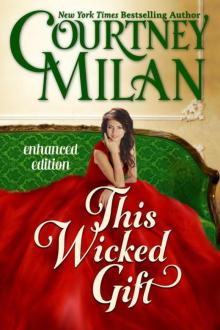 This Wicked Gift
This Wicked Gift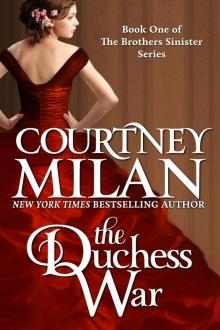 The Duchess War (The Brothers Sinister)
The Duchess War (The Brothers Sinister)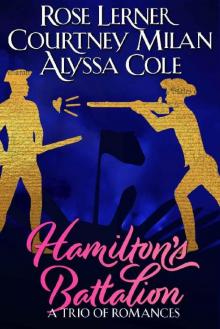 Hamilton's Battalion: A Trio of Romances
Hamilton's Battalion: A Trio of Romances The Turner Series
The Turner Series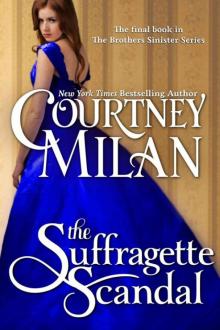 The Suffragette Scandal (The Brothers Sinister)
The Suffragette Scandal (The Brothers Sinister)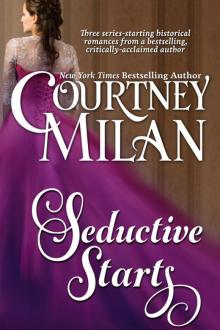 Seductive Starts
Seductive Starts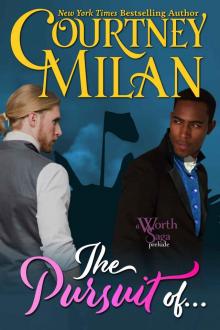 The Pursuit Of…
The Pursuit Of…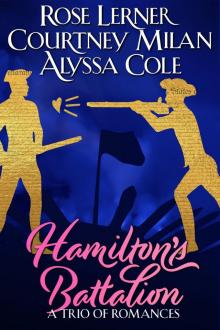 Hamilton's Battalion
Hamilton's Battalion The Carhart Series
The Carhart Series Seven Wicked Nights
Seven Wicked Nights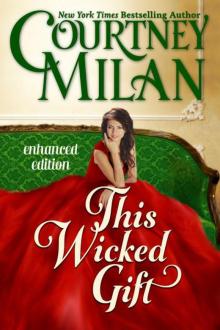 This Wicked Gift (A Carhart Series Novella)
This Wicked Gift (A Carhart Series Novella)